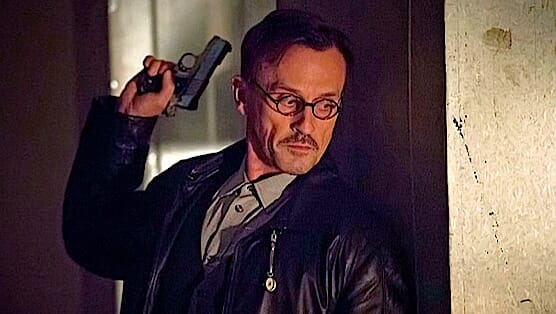Arrow: “Time of Death” (Episode 2.14)

Man, Arrow has really been hitting those CW buttons lately.
Returning from a month-long hiatus, the show wastes no time diving back into the more soapy, high drama tendencies that the network is known for. In fact, I’m almost positive that if you cut out all the superhero/action-based sequences from “Time of Death,” you’d still be left with a pretty solid “pretty white people with problems”-esque hour.
“Time of Death” picks up shortly after the events of “Heir to the Demon,” which found Oliver and Sara rekindling their old romantic flame. This news, of course, is yet another dagger to the heart for Felicity, who must now deal with the fact that her longtime crush is not only with a beautiful woman who is his physical equal but also her equal in terms of a comprehensive knowledge of technology and science. Her feelings of inadequacy are established in an early scene where she walks into the headquarters to find Oliver, Diggle and Sara sparring. And, yeah, if ever there was a quicker way to make anyone feel bad about themselves, it’s pitting a shirtless Oliver and Diggle, with their bulging muscles and scars, against the equally toned and scarred Sara. (The three even share a very humorous moment where they compare of battle scars.) Felicity’s self-loathing is only intensified when a villain named William Tockman, aka, Clock King (get it, “Tock” man? Gotta love the Golden Age stuff) begins orchestrating a series of robberies. Upon trying to hack his system, Felicity falls right into the villain’s trap, allowing him to hack into their systems and destroy the entire computer grid.
Of course, Felicity eventually redeems herself in the climax by using Tockman’s techniques against him, downloading the same program to his cell phone, thus causing it to explode and disable him. From here, we are treated to one of the season’s most adorable scenes—a wounded Felicity hopped up on Oxycodone. Now much more uninhibited than usual, Felicity directly addresses her fears to Oliver that she’s no longer “his girl,” to which Oliver gently replies that Felicity will “always be my girl.” The Oliver/Felicity shippers are going to have a field day with that one….
Meanwhile, Oliver and Sara are still trying to figure out how to handle their new romance, especially with Laurel being in the state she’s in. Also, lest we forget, Oliver is still giving his mother the silent treatment after discovering her lies about Thea’s real father. The complications of this secret estrangement soon becomes problematic when Thea begins noticing the clear tension between the two and tries to find out what’s wrong. Considering how much time the family will have to spend together in the wake of the election, I reckon it’s only a matter of time before the truth comes to light. And, speaking of the truth coming to light, the proverbial cat comes flying out of the bag when Oliver ends up attending a Laurel family dinner and an unstable Laurel quickly realizes that the two are back together. Needless to say, dramatic yelling ensues.
-

-

-

-

-

-

-

-

-

-

-

-

-

-

-

-

-

-

-

-

-

-

-

-

-

-

-

-

-

-

-

-

-

-

-

-

-

-

-

-








































